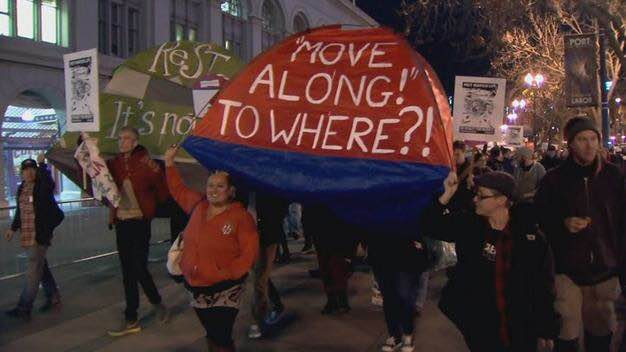Proposition Q is an ordinance prohibiting the placement of tent encampments on public sidewalks, justified in part by Section 169 of the San Francisco Police Code, that attempts to argue that a solution to alleviating homelessness is offering temporary housing and redistribution outside of San Francisco.
The San Francisco City Controller, Ben Rosenfield, in his letter to John Arntz of the Department of Elections analyzing Prop Q, and Section 169 of The San Francisco Police Code contains significant discrepancies regarding homeless housing and rehabilitation in society. Rosenfield states in his letter that “the proposed ordinance does not specify the number of days of housing that must be offered.” In addition to this, the ordinance would also require the city to offer “Homeward Bound” assistance, a program that pays transportation fees to reunite homeless individuals to their family or friends outside of San Francisco. Section 169 of the SFPD code lacks any clear and effective methods and goals assisting homeless people while attempting to argue that the department has an obligation to assist them. Instead, the language used in the code attempts to separate homeless people from San Franciscans as if the two are entirely separate.
Rather than address the issue of homelessness as a policy issue regarding lack of affordable housing and minimum wage jobs, the ordinance suggests a temporary band aid solution to a much larger problem. What is relevant here is not that Prop Q does not specify the number of housing days offered or the assumption that homeless people have friends or family outside of San Francisco to live with, but the reality is the ordinance neither establishes and expands social services that have stable long term goals challenging homelessness, nor does it even acknowledge that the root of homelessness is caused by poor decision-making by the City and State government. Instead, it seeks to temporarily alleviate homeless encampments from the public eye and redistribute the homeless population outside of San Francisco.
The language employed in Section 169 of the San Francisco Police Code evidently alienates the homeless population from San Franciscans while establishing the facade that the police department has any capability of operating as a social service organization to assist homeless individuals. The section establishes goals but not the methods leading to homeless housing and rehabilitation. Regarding homeless encampments, the section states that they are “unsafe and unhealthy for the people living in them, and they make our neighborhoods less safe and less healthy for families, residents, and visitors to the City,” as if families, residents, and visitors to the city do not constitute the homeless population at all.
These encampments are a result of poor policies in San Francisco’s history dating back to the early 1980’s when the federal government, under the Nixon and Reagan administration, defunded public housing and other social services as a response to the recession. The public housing budget decreased drastically from $16 billion to $1 billion from 1979 to 1983, and as a result the homeless population began to grow.
The popular and outdated theory of trickle-down economics, which seeks to alleviate taxpayers, does no good in San Francisco when such a vulnerable community—when such vulnerable San Franciscans—lack basic housing. In addition, because temporary quick-fixes like Prop Q do not seriously challenge homelessness but move individuals elsewhere, other Bay Area cities can expect an influx of homeless individuals if this proposition is passed. Until the housing market stops rising and there is enough low income housing to satisfy low and middle income homeowners, homelessness will continue to be an issue exacerbated by poor policy making.
Prop Q and many others propositions initiated by our local government have yet to create any real and effective change combatting homelessness. Instead, it continues to mask issues in the housing and job market, and it worsens homeless living experiences as well. Voters should vote NO on Prop Q and begin to demand that our city government seek long term goals decreasing the price of housing and increasing the amount of minimum wage jobs. On a more personal and individual level, voters should spread awareness about San Francisco’s homelessness issue, criticize the policies and methods our city government uses ignoring it, and sign petitions urging our state legislature to adopt new and effective policies assisting middle and low income communities.
Prop Q fast facts
- Will ban tent encampments and authorize the City to remove them within 24 hours
- Offers no actual housing when clearing encampments. It will offer no expansion of social services: no extra shelter beds, no housing opportunities, no outreach services, no mental health services
- Will only provide a shelter bed for one night or a bus ticket out of San Francisco through the Homeward Bound program
- There are already City laws that address encampments


